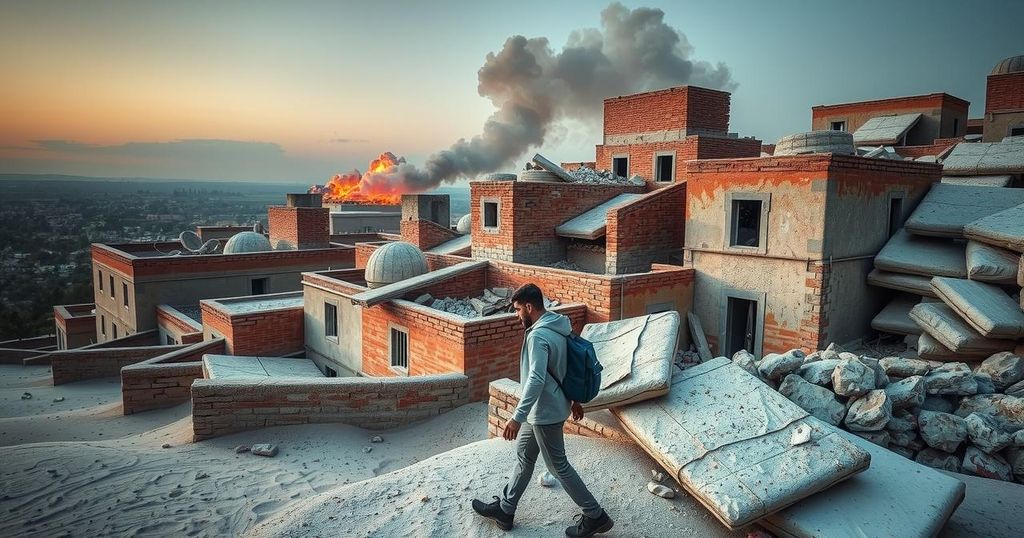Syria’s Path to Freedom: Challenges and New Beginnings Ahead
Syria’s unexpected liberation has ignited a range of emotions among citizens as they reclaim their freedoms. The HTS coalition’s inclusive leadership signifies hope for a new government, yet the nation faces ongoing challenges from foreign interventions and internal divisions. A focus on genuine representation and the negotiation of strategic governance remains critical for Syria’s stability and future prosperity.
The unexpected liberation of Syria has sparked a wave of emotions among its citizens, who celebrated their newfound freedom with fervor. Women, previously marginalized during the conflict, have re-emerged prominently in this period of revival. However, the somber reality of loss remains, as many families reconcile with the fate of their loved ones who perished in detention under the Assad regime, with mass graves being uncovered across the country.
The successful ousting of the regime can largely be attributed to the disciplined approach adopted by the Hayat Tahrir al-Sham (HTS) rebel coalition. Their sensitivity towards diverse communities, coupled with the absence of harassment in liberated territories, motivated numerous Assad soldiers to defect. Ahmed al-Sharaa, the charismatic leader of HTS, has cultivated a non-dictatorial image, demonstrating pragmatism in governance by embracing the complexities of Syria’s multicultural society. He effectively recognized that sustainable leadership demands flexibility and inclusivity.
Amidst these developments, Sharaa has acknowledged that HTS cannot dominate Syria alone, recognizing the essential roles played by various factions in the revolt. Promising respect for the rights of all sectarian groups, HTS has disbanded its religious police and plans to transform into a national army. The appointment of Mohammad al-Bashir as prime minister of a transitional government signifies a partnership with civilian and technocratic leadership aimed at rebuilding the war-torn nation through comprehensive service provision.
Inclusivity in drafting a new constitution remains a pressing concern, necessitating genuine participation from all societal segments, including Alawites and secularists, who are presently navigating their place within the new landscape. Meanwhile, the opposition coalition, though diverse and historically rich, faces challenges due to its lack of governance experience and its perceived ties to foreign interests, particularly from Turkey.
Externally, the challenges facing the new Syrian government are profound. Although liberated from Iranian and Russian dominance, Syria continues to grapple with other occupations and conflicts, particularly in the north-east. Turmoil persists as Turkey clashes with Kurdish factions, while US-supported groups exhibit troubling behavior towards civilians. The new leadership faces the daunting task of negotiating with these adjacent forces while asserting its authority.
Additionally, the western sanctions imposed by the EU and the US, which remain in place despite the regime’s downfall, pose significant hurdles for the rejuvenation of Syria. While Israel’s continued military actions in Syrian territory exacerbate these difficulties, the resilience of the Syrian people ultimately shapes their future. As the statues of past tyrants fall and a new chapter begins, it is clear that the spirit of the Syrian populace will remain the defining force in the nation’s trajectory.
Syria’s recent liberation marks a significant turning point in its protracted conflict, leading to a complex interplay of emotions and aspirations among its people. After decades of authoritarian rule and internal strife, the citizens are now grappling with the joys of newfound freedom and the profound grief of lost loved ones. The HTS coalition has emerged as a crucial player in this political landscape, demonstrating a surprisingly inclusive approach while navigating the multifaceted ethnic and sectarian divides that define Syrian society. Nevertheless, Syria’s sovereignty is still challenged by foreign powers and lingering internal conflicts, necessitating strategic governance and reconciliation for its future stability.
The fall of the Assad regime heralds a hopeful yet challenging era for Syria. With the leadership of figures like Ahmed al-Sharaa aiming to foster an inclusive and cohesive governance structure, the path forward requires careful diplomacy with both domestic factions and foreign powers. The fortitude demonstrated by the Syrian people during this transitional period suggests that, despite external pressures, the nation possesses the resilience necessary to forge its own destiny in a post-conflict environment.
Original Source: www.theguardian.com




Post Comment